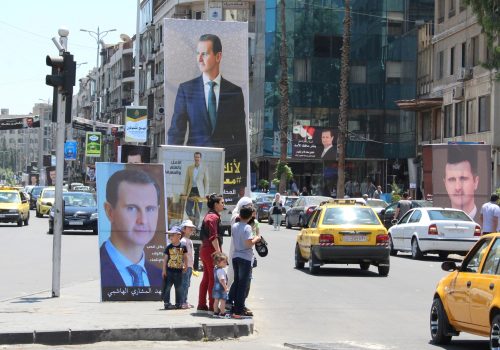The case for a Western initiative in Northeast Syria: A European perspective
The time has come for the United States and its core allies on the Syrian issue—foremost among them France and the United Kingdom—to adopt a robust initiative toward northeast Syria. The threat of a new Turkish ground offensive against the Syrian Democratic Forces (SDF), who are already subject to bombardments and other forms of pressure, makes the issue more pressing than ever. While this may currently seem like less of an eventuality than it did a few months or weeks ago, Turkish President Recep Tayyip Erdogan will face elections in May.
Erdogan has blamed the People’s Protection Units (YPG), the Syrian branch of the Turkish Kurdistan Workers Party (PKK), for the November 2022 bombing in Istanbul, and promised that perpetrators “will be punished as they deserve.” He has long insisted that some of the Syrian refugees in Turkey should be made to return home, following increasing xenophobic rhetoric in Turkey as the country’s economy suffers. The Turkish president must also take into consideration the views of his main nationalist allies, and of some opponents who are critical of his Syria policy. Whatever the motive, a renewed offensive in the north of Syria in the near future cannot be ruled out.
A second interrelated reason to push for a renewed initiative is that the Russians are poised to capitalize on Erdogan’s willingness to change his posture towards Syria. They are encouraging a rapprochement with Damascus, which we have seen the outline of in recent months. This outline has become clearer since the meeting of the Syrian and Turkish defense ministers in Moscow on December 28, 2022. A meeting of their respective ministers of foreign affairs is also on the cards. While normalization would be in Bashar al-Assad’s interest, he has nonetheless placed the bar very high, keeping with his clan’s customs.
Even if Erdogan were to lose the election, it would be wrong to expect a new Turkish government to take a fundamentally different approach. Western powers risk finding themselves in a double bind: they could face a new Turkish offensive in the north, despite opposition from Damascus—though likely with a yellow light from Russia—or, perhaps, a tripartite accord between Ankara, Moscow, and Damascus, which would lead to an identical result—namely the destabilization of northeast Syria and the endangering of the West’s Kurdish allies.
Another reason to regain the initiative concerns the deterioration of the situation in the northeast. The war in Ukraine is consuming the attention of all Western decision-makers at the expense of secondary challenges. The global economy is fragile, the governance of the SDF has barely evolved, and the Islamic State of Iraq and al-Sham (ISIS) remains active, biding its time. Meanwhile, the Assad regime and Iran’s Islamic Revolutionary Guard Corps (IRGC) continue to exploit the discontent of Arab populations across the region. Regardless of Turkey, the status quo presents growing difficulties for the SDF and the West in this zone.
What kind of initiative could be launched? The components have long been clear, revolving around two distinct but complementary tracks.
Track one would consist of negotiating a clear strategic bargain with the SDF leaders. In order to survive, the SDF requires a firm security guarantee and much greater economic investment than their allies are currently making. In return, the countries that support the SDF need the Autonomous Administration of North and East Syria (AANES), the SDF’s governance structure, to meaningfully include the non-YPG local population, including the Arab majority. They also need an end to intra-Kurdish disputes, notably those between the Syrian Kurdish National Council (ENKS) and the Kurdistan Democratic Union Party (PYD), the political wing of the YPG. A key point over which to defuse Turkish hostility would be moving ahead with the disassociation of the PYD and the PKK and the inclusion of non-YPG Kurdish parties. Specifically, a gradual departure of foreign PKK cadres to the group’s rear base in the Qandil near the Iraq-Iran border should be organized under the protection of the anti-ISIS coalition.
A second track would be to negotiate with Turkey on a gradual easing of its aggressive posture towards the Syrian Kurds, insofar as their governance structure evolves and the disassociation between the PKK and the PYD moves forward. Turkey has legitimate concerns about the security of its borders in this zone. It is in its long-term interest to reach a modus vivendi with the AANES rather than remaining on a perpetual war footing. Experience shows it is not the Assad regime that will resolve Turkey’s security dilemmas, contrary to what the Russians would have Ankara believe.
But how to ensure the synchronization of these two tracks? One possible approach would be to proceed in stages. An initial stage would involve freezing hostile actions on both sides—equally on the part of Turkey and the YPG. In subsequent stages, imaginative solutions could be found to introduce confidence-building measures, leading to cooperation between the two parties. It is here that the commitment of the three western powers could and should be determinative. There is reason to believe that Paris and London are ready, but the United States can bring Ankara and the YPG around.
The involvement of one Gulf country—the United Arab Emirates (UAE) being the most obvious choice, given its willingness to play a role in Syria—would likewise be expedient, both politically—to reassure the Arab populations of the region—and financially—since the stabilization of northeast Syria will hinge upon ensuring its economic viability. Fortunately, the Joe Biden administration has recently granted waivers covering northeast Syria, thereby half-opening the door to economic opportunities.
Reciprocal engagement between Turkey and the “de-PKK-ified” YPG is the only sure way for Turkey to facilitate the return of some Syrian refugees on fair terms. Equally, for the YPG, a thaw in relations with Turkey is the only way to guarantee the stabilization of northeast Syria. There is now a Russian offer on the table for Ankara, engaging with Turkey’s inclination to attack the YPG again. There must also be an offer from the US and its allies to re-orient Turkey towards a more constructive attitude.
The recent visit to Washington by Turkish Foreign Minister Mevlut Cavusoglu on January 18 does not appear to have tangibly altered the equation. Viewed from Europe, the prevailing impression is that Syria is a blind spot in the Biden administration’s foreign policy. If the US and its allies don’t regain the initiative in northeast Syria, Russia and Iran will be the great beneficiaries of the likely destabilization of this region. If they are able to move forcefully, relevant Arab countries could be requested to make their normalization of ties with the Assad regime conditional on a commitment from Damascus to respect the dynamics of northeast Syria within the framework of a decentralization law. This region must clearly remain free of the military and intelligence forces of the Assad regime.
To which extent could the terrible 7.8-magnute earthquake on February 6, which devastated large regions of Turkey and Syria, impact this proposal? In political terms, the Assad regime will try to exploit the situation to get rid of the sanctions regime and rally neighboring countries on the idea of normalization. For Erdogan—who is facing a strong wave of criticism despite the massive international aid coming from numerous countries—his position could be weakened from the perspective of the elections.
In fact, those two factors—regarding the Assad regime as well as Erdogan’s government—could provide additional reasons and potential opportunities to develop an initiative to stabilize northeast Syria. This initiative would not amount to a comprehensive approach aiming to solve all problems. However, it would offer strategic direction at the very least and a clear indication of a fresh Western commitment to defend its basic interests in the Syrian quagmire.
Ambassador Michel Duclos is a nonresident senior fellow at the Atlantic Council’s Rafik Hariri Center for the Middle East and a senior advisor to the Institut Montaigne. Follow him on Twitter: @MrjDuclos.
Further reading
Thu, Feb 9, 2023
In Syria, the earthquake ‘did what the Assad regime and Russians wanted to do to us all along’
MENASource By Arwa Damon
While aid increasingly flows into Turkey from around the world by air, land, and sea, areas on the other side of the border in Syria’s rebel-controlled areas are seeing none of that.
Thu, Feb 10, 2022
A perpetrator of Syrian crimes against humanity went free in France. Here’s why it shouldn’t happen again
MENASource By Michel Duclos
If the scope for changing the course of events in Syria is limited, it’s honorable to take a stand against the abominable crimes of the Bashar al-Assad regime. It would be a great pity for France to be seen as a safe haven for Assad’s accomplices.
Fri, Sep 17, 2021
Syria after the fall of Kabul: A European perspective
MENASource By Michel Duclos
There is at least one common factor between Syria and Afghanistan: just as the Taliban has not changed once it took back power, the Bashar al-Assad regime will not change once its power is affirmed.
Image: Since the beginning of the Turkish operation in northern Syria, several hundred Kurdish fighters and civilians have died. On October 21, in the city of Derîk, six of them were buried. All were killed during the ceasefire. via Reuters


